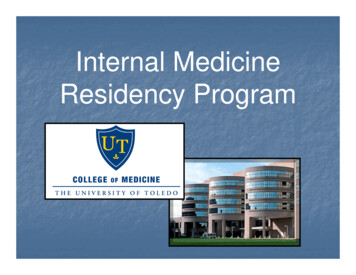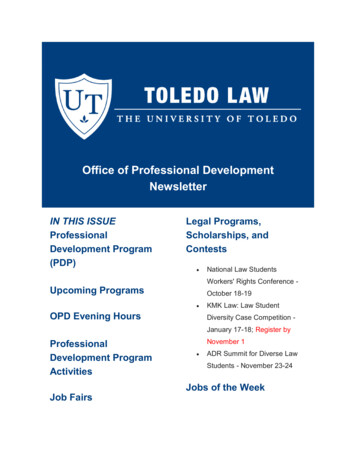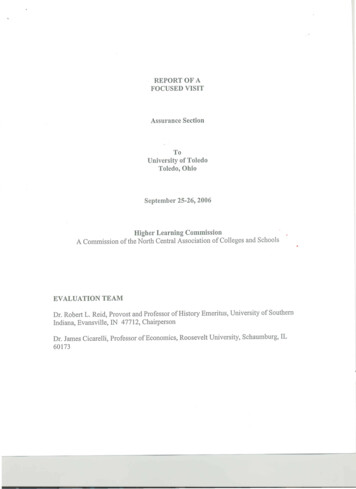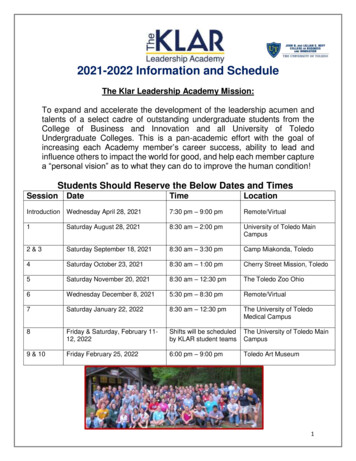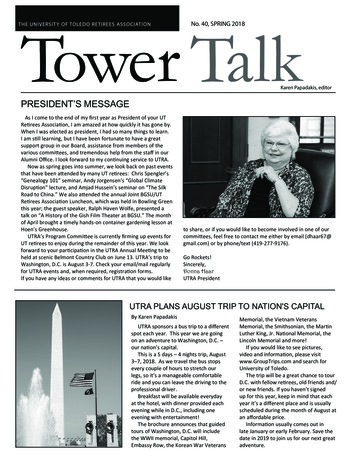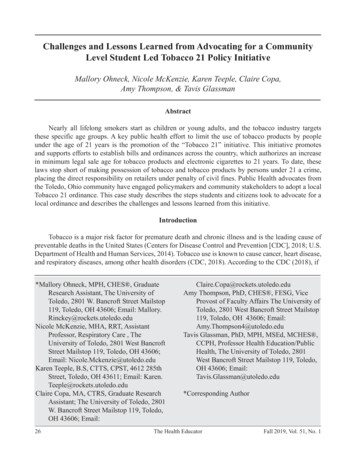
Transcription
AGREEMENT BETWEENUNIVERSITY OF TOLEDOANDUNIVERSITY OF TOLEDO CHAPTER OF THE AMERICAN ASSOCIATION OFUNIVERSITY PROFESSORS(COLLEGE OF LAW)EFFECTIVEJuly 1, 2021 through June 30, 2024
TABLE OF CONTENTSARTICLE 1 DEFINITIONS . 1ARTICLE 2 RECOGNITION AND DESCRIPTION OF THE BARGAINING UNIT . 2ARTICLE 3 NON-DISCRIMINATION . 3ARTICLE 4 MANAGEMENT RIGHTS . 4ARTICLE 5 FACULTY RIGHTS AND RESPONSIBILITIES . 4ARTICLE 6 CONFLICT OF INTEREST . 6ARTICLE 7 ACADEMIC GOVERNANCE . 6ARTICLE 8 TENURE, RENEWAL AND PROMOTION . 7ARTICLE 9 EVALUATION . 14ARTICLE 10 ASSIGNMENT . 34ARTICLE 11 INSTITUTIONAL ENVIRONMENT . 41ARTICLE 12 COMPENSATION . 42ARTICLE 13 HEALTH CARE BENEFITS . 52ARTICLE 14 OTHER BENEFITS . 53ARTICLE 15 LEAVES . 55ARTICLE 16 OUTSIDE EMPLOYMENT AND ACTIVITIES . 64ARTICLE 17 DISCOVERIES, INVENTIONS, PATENTS, AND COPYRIGHTS . 65ARTICLE 18 CORRECTIVE ACTION . 68ARTICLE 19 . 70ARTICLE 20 GRIEVANCES . 70ARTICLE 21 NO STRIKE/NO LOCKOUT . 75ARTICLE 22 UT-AAUP-COL . 75ARTICLE 23 ENTIRE AGREEMENT . 76ARTICLE 24 SEPARABILITY . 76ARTICLE 25 LABOR-MANAGEMENT MEETING . 76i
ARTICLE 26 TERM OF THE AGREEMENT . 77ARTICLE 27 DISTRIBUTION OF AGREEMENT . 77ARTICLE 28 DISTANCE LEARNING . 77ARTICLE 29 MISCELLANEOUS . 78SIGNATURE PAGE . 79APPENDIX A—MOU PILOT PROGRAM . 80APPENDIX B—TITLE IX MOU TA . 82APPENDIX C—COL DISTANCE LEARNING MOU. 84APPENDIX D—UT AAUP GRIEVANCE FORM . 86ii
ARTICLE 1DEFINITIONS1.1“ABA” The American Bar Association.1.2“AGREEMENT” The collective bargaining agreement between The University of Toledoand the UT-AAUP-COL governing the terms and conditions of employment for thebargaining unit more fully described in Article 2.1 herein.1.3“AMERICAN ASSOCIATION OF UNIVERSITY PROFESSORS, UNIVERSITY OFTOLEDO CHAPTER” The exclusive representative of the employees in the BargainingUnit, pursuant to certification by the Ohio State Employment Relations Board in casenumber 2018-REP-05-0048 (also called “UT-AAUP-COL”).1.4“ARPA” Annual Report of Professional Activity.1.5“BARGAINING UNIT” The unit of faculty employees more fully described in Article 2.1of this Agreement.1.6“BOARD” (also called “EMPLOYER” or “BOT”) The Board of Trustees for TheUniversity of Toledo.1.7“CCAP” College Committee on Academic Personnel more fully described in Article 9.1.8“COLACC” College of Law Advisory Committee on Compensation more fully describedin Article 12.1.9“COLLEGE” OR “COL” The University of Toledo College of Law.1.10“COLLEGE ELABORATIONS” Expectations, evidence, standards, and requirementsrelating to the retention, tenure, and promotion processes specific to Tenured and TenureTrack Faculty at the College of Law together with expectations, evidence, standards, andrequirements relating to the retention, security of position, and promotion process ofClinical Faculty and Legal Writing Faculty.1.11“DAY” A working day exclusive of all Saturdays, Sundays and official holidays observedby the University within the work year.1.12“EMPLOYER’S DESIGNEE” The Employer’s designee is Management’s representativefor Faculty Labor Relations. If the Employer’s Designee changes the Administration willnotify the UT- AAUP-COL Designee in writing within five (5) days of the change.1.13“ESTABLISHED NON-TENURE TRACK PROFESSORS” Non-Tenure track memberswho have successfully completed the probationary period more fully described in Article8 of this Agreement.1.14“FMLA” Family and Medical Leave Act of 1993, as amended.1
1.15“MANAGEMENT” The Board together with its executive officers and professional staffincluding but not limited to the President, Provost, Vice Presidents, Deans and all suchother management personnel as defined in Chapter 4117 Ohio Revised Code.1.16“MEMBER” or “MEMBERS” Unless expressly specified otherwise, these terms shallrefer to members of the Bargaining Unit.1.17“NAMED PROFESSOR” College of Law Faculty who hold named professorships that aresupported by endowment (presently, the Anderson, Balk, Fornoff, and Stoeplerprofessorships), or any additional named professorship created during the term of thisAgreement. Any remuneration received as the result of being designated as a NamedProfessor shall be excluded from base pay for calculation of raises under Article 12 of thisAgreement.1.18“OUTSIDE EMPLOYMENT” Employment, including self-employment, which is notcontracted for through the University of Toledo and for which any remuneration paid isnot paid through the University.1.19“PRESIDENT” The President of The University of Toledo unless expressly specifiedotherwise.1.20“TERMINAL APPOINTMENT” An appointment that has no expectation of continuedemployment beyond the stated end date of the appointment.1.21“UT-AAUP-COL DESIGNEE” The UT-AAUP-COL’s may identify a Designee undercertain articles in this Agreement. If the UT-AAUP-COL Designee changes, the UTAAUP-COL will notify the Employer’s Designee in writing within five (5) days of thechange.1.22“UT-AAUP TENURE, TENURE-TRACK BARGAINING UNIT” The bargaining unitcertified as the exclusive representative by the Ohio State Employment Relations Board inCase No. 90-RP-0321, dated February 25, 1992, amended by SERB in Case No. 2013REP-06-053, dated June 27, 2013.1.23“UT-AAUP-TT CBA” The Collective Bargaining Agreement between the University andthe UT-AAUP Tenure-Tenure-Track Bargaining Unit expiring June 30,2022.1.24“YEAR” An Academic Year consists of a consecutive Fall Semester and Spring Semesterof full-time service, unless otherwise indicated.ARTICLE 2RECOGNITION AND DESCRIPTION OF THE BARGAINING UNIT2.1The Board hereby recognizes the UT-AAUP-COL, pursuant to certification by the OhioState Employment Relations Board (SERB) in case 2018-REP-05-0048, dated February13, 2019, as the exclusive representative for the purpose of collective bargaining with2
respect to wages, hours, terms, and other conditions of employment in the Bargaining Unitdescribed below:Included: All College of Law full-time faculty, which is agreed to be comprised of itsfull-time Tenured and Tenure-Track Faculty, Clinical Faculty and Legal WritingFaculty appointed to teach in the Juris Doctor program within the College of Law.The parties agree that full-time College of Law faculty shall retain suchcharacterization notwithstanding a reduction in teaching load due to other assignmentsprovided they continue to teach at least one course a year and are not in a managementor supervisory position. In the event an additional category of full-time faculty iscreated pursuant to the terms and conditions of this Agreement, such faculty shall alsobe included within the scope of this Agreement and bound by its terms.Excluded: Part-time faculty, faculty serving at the College of Law on visitingappointments, faculty whose appointment is in another college, faculty whoseprincipal appointment is to teach in any program other than the Juris Doctor, EndowedChairs, superannuates, other retired faculty, all managerial and supervisoryemployees, and all other College of Law employees. The parties acknowledge that thecurrent Named Professorships in the College shall not be considered Endowed Chairsfor purposes of this Agreement. Furthermore, the parties agree that with regard to thereference to managerial and supervisory employees, the only faculty that fall withinsaid concept, as the College is currently configured, are the Dean, the Associate Deanfor Academic Affairs, and the Assistant Dean for the LaValley Law Library.2.2The Employer shall not aid, promote, or finance any group or organization other than theUT-AAUP-COL which purports to engage in or to be interested in engaging in collectivebargaining on behalf of the Members of the Bargaining Unit. The Employer shall not aid,promote, or finance any group or organization that seeks to undermine UT-AAUP-COL'sstatus as representative of the Bargaining Unit.2.3If, during the term of this Agreement, questions arise as to the Bargaining Unit status ofone or more professional staff employees whose positions are not otherwise excluded insection of this Agreement, the parties will meet promptly to discuss the status of thepositions and shall attempt to reach agreement as to the positions' inclusion or exclusionfrom the Bargaining Unit. If the parties are unable to reach agreement as to the status ofthe position within ten (10) calendar days from the commencement of the discussions,either party may petition SERB for a determination of the status of the position. Thisprocedure shall also apply to mergers, acquisitions and expansions of the University.Individual contracts of employment with Members of the Bargaining Unit will be in allrespects consistent with this Agreement, which will be incorporated by reference in suchindividual contracts.ARTICLE 3NON-DISCRIMINATION3.1The Employer and UT-AAUP-COL agree that they shall not discriminate nor toleratediscrimination against any Member in matters of wages, hours, terms, and other conditions3
of employment on the basis of race, color, religion, sex, age, national origin or ancestry,sexual orientation, gender (including identity and expression), genetic information,military or veteran status, a real or perceived disability, marital status, domestic partnerstatus, political affiliation, or any other characteristics protected by Federal or Ohio Law.3.2The Employer and UT-AAUP-COL hereby express their strong opposition to andcondemnation of all forms of sexual harassment and agree to maintain educational andworking environments that are free from any form of discrimination based on sex.3.3The Employer shall not discriminate against any Member of the Bargaining Unit for anyactivities on behalf of the UT-AAUP-COL or for membership in the UT-AAUP-COL.ARTICLE 4MANAGEMENT RIGHTSExcept as expressly limited by the terms of this Agreement, the Board, directly or acting throughits duly constituted authorities, retains and reserves exclusively to itself all powers, rights,authority, prerogatives, duties and responsibilities conferred upon and vested in it by the laws andconstitution of the State of Ohio and of the United States, and as specifically set out in O.R.C.§4117.08(C), whether exercised or not. Without limiting the generality of the foregoing, exceptwhere expressly stated in this Agreement, nothing contained herein shall in any way limit theBoard's right to adopt new or modify or terminate existing policies, rules, regulations, andprocedures in furtherance and accomplishment of its statutorily mandated authorities andresponsibilities. The Board acknowledges its duty to bargain in good faith over the employmenteffects of such actions if its managerial prerogatives have an effect on wages, benefits, hours orworking conditions. Upon fulfilling said duty, the Board may implement its proposed actions.Except as specifically modified by an express provision of this Agreement, none of the rightsreserved exclusively to the Board shall be subject to the grievance procedure of this Agreement.ARTICLE 5FACULTY RIGHTS AND RESPONSIBILITIES5.1Academic Freedom5.1.1 Members are entitled to full freedom in research and in the publication of theresults, subject to the adequate performance of their other academic duties.Research for pecuniary return shall not compromise the intellectual integrity orreputation of the University. Research for pecuniary return, excluding ordinarybook royalties, shall be based upon a prior understanding with the Dean.5.1.2 Members are entitled to full freedom in both the physical or virtual classroom indiscussing their subject, but they shall be careful not to introduce into theirteaching controversial matter which has no relation to their subject.5.1.3 As members of the legal profession, Members are entitled to full freedom whenacting as lawyers and advocates in ways consistent with governing rules ofprofessional responsibility. This includes full freedom in representing4
controversial or unpopular clients and in advocating for unpopular orcontroversial positions. It also includes full academic freedom in the selection ofand representation in clinical cases by Members.5.1.4 Members are citizens, members of a learned profession, and faculty of theUniversity. When they speak or write as citizens, they shall be free fromUniversity censorship or discipline, but their special position in the communityimposes special obligations. As scholars and educational officers, they mustremember that the public may judge their profession and the University by theirutterances. Hence, they must at all times be accurate, exercise appropriaterestraint, show respect for the opinions of others, and make every effort to indicatethat they are not speaking for the University.5.1.5 Librarians shall be free to choose resources and to provide services for the interest,information and enlightenment of all members of the academic community. In nocase shall resources be excluded from University libraries because of theirauthor(s) or their scientific, economic, social, political, or religious views. Nolibrary resources shall be proscribed or removed from the libraries because ofpartisan or doctrinal disapproval.5.2Professional Obligations5.2.1 Members, guided by a deep conviction of the worth and dignity of theadvancement of knowledge, shall recognize the special responsibilities placedupon them. Their primary responsibility to their subject is to seek and to state thetruth as they see it. To this end Members shall devote their energies to developingand improving their scholarly competence. They have an obligation to exercisecritical self-discipline and judgment in using, extending, and transmittingknowledge and in advocating for legal and social change. They shall practiceintellectual honesty. Although Members may follow subsidiary interests, theseinterests must never seriously hamper or compromise their freedom of inquiry.5.2.2 As teachers, Members shall encourage the free pursuit of learning in their students.They shall hold before them the best scholarly and ethical standards of theirdiscipline. Members shall demonstrate respect for students as individuals andadhere to their proper roles as intellectual guides and counselors. Members shallmake every reasonable effort to foster honest academic conduct and to ensure thattheir evaluations of students reflect each student's true merit. They shall respectthe confidential nature of the relationship between professor and student. Theyshall avoid any exploitation, harassment, or discriminatory treatment of students.They shall acknowledge significant academic or scholarly assistance fromstudents. They shall protect students' academic freedom.5.2.3 As colleagues, Members have obligations that derive from common membershipin the community of scholars. Members shall not discriminate against or harasscolleagues. They shall respect and defend the free inquiry of associates. In theexchange of criticism and ideas, Members shall show due respect for the opinionsof others. Members shall acknowledge academic debts and strive to be objective5
in their professional judgment of colleagues. Members shall accept their share offaculty responsibilities in the academic governance of the University.5.2.4 As legal professionals, Members must comply with all applicable rules ofprofessional conduct and applicable ABA standards.ARTICLE 6CONFLICT OF INTERESTTo the extent that Members may be subject to the Ohio Ethics Laws found in O.R.C. §102 and§2921, they must file all notifications of conflicts of interest required by said statutes with theGeneral Counsel of the University. This requirement shall be interpreted in a manner consistentwith a member's ethical or fiduciary obligations as an attorney under any applicable rule ofprofessional conduct as promulgated from time to time.ARTICLE 7ACADEMIC GOVERNANCE7.1The vital importance of faculty participation in the making of academic policy impactingthe College of Law is hereby recognized.The Faculty Senate is the organ through which the faculty speak on matters of Universitywide academic policy and other matters not subject to collective bargaining.The Employer will seek input from the Faculty Senate on the following matters:undergraduate curriculum, including addition or elimination of academic courses,certificates, programs and degrees; standards and requirements for degrees; academic rules,regulations, policies and standards regarding undergraduate students; and thereorganization of colleges and departments. Additionally, at such time as the Universityundertakes a University wide strategic planning process, the administration will seek inputon nominations from the Faculty Senate Executive Committee for membership on eachcriteria team.Notwithstanding the foregoing limitation, due to the institutional benefits to be derivedfrom a robust culture of shared governance, the administration is committed to obtaininginput from the Faculty Senate on major policy decisions of the University regardless oftheir particular subject matter and shall attempt to obtain such input to the degree it isreasonably practicable to do so.Additionally, decisions made by the administration, under this section, shall be fullyreported and explained to the Faculty Senate in written detail in order to allow the FacultySenate to understand the rationale of a given decision.7.2The Faculty of the College is the instrumentality through which the Faculty speaks onmatters pertaining to the College's ABA-Accredited Juris Doctor Program and othermatters not subject to collective bargaining. Shared governance at the College of Law shallbe consistent with ABA Accreditation Standard 201: Law School Governance. Theprocesses and procedures set forth in the College of Law's Government Rules shall be the6
means of achieving shared governance, including practices developed by the partiesthereunder. In meeting this standard, the Dean and Faculty of the College of Law shall eachhave a significant role in planning, implementing, and administering the program of legaleducation of the College of Law (including curriculum, addition, consolidation, orelimination of academic courses, certificates, programs and degrees; subject matter andmethods of instruction/evaluation; admissions policies/procedures; academic rules;regulations, policies and standards (including standards and requirements for degrees); andthose aspects of the student experience that relate to the educational process).Due to the institutional benefits to be derived from a robust culture of shared governance,the administration is committed to obtaining input from the Faculty of the College of Lawon major policy decisions that specifically impact the College of Law and do not fall withinthe purview of the Faculty Senate or ABA Accreditation Standard 201, and shall attemptto obtain such input to the degree it is reasonably practicable to do so. In particular, butwithout limiting the generality of the foregoing, the Employer will seek input from theFaculty of the College of Law on matters pertaining to any reorganization or merger thatincludes the College of Law.7.3The principle of faculty participation in the selection of academic officers is affirmed.Faculty of the College of Law will have meaningful input in the appointment orreappointment of the Dean. The initial appointment of the Dean shall require theaffirmative vote of the majority of the College of Law faculty entitled to vote, in accordancewith the parties' historic practice. Additionally, the Faculty of the College of Law shall beprovided an opportunity to provide input prior to the selection of any Associate Dean forAcademic Affairs, the selection of any Interim Dean, and the renewal of any Dean, of theCollege of Law.7.4The Employer acknowledges the importance of maintaining the American Bar Associationaccreditation for the College of Law. For so long as employer wishes to maintain theCollege of Law, Employer intends to keep the College of Law's ABA accreditation andwill take steps in accordance therewith.7.5With respect to this article, the UT-AAUP-COL is restricted to the Article 20 Grievancesand waives all right or ability to restrict or challenge decisions made by the Board ofTrustees, University leadership, or the College of Law administration. The UT-AAUPCOL may contest only the Employer's failure to seek input from the Faculty Senate or theFaculty of the College of Law on the matters specifically set forth in sections 7.1, 7.2, 7.3,and 7.4 and not the content of any decision reached after such input has been sought.ARTICLE 8TENURE, RENEWAL AND PROMOTION8.1 Tenure-Track Faculty8.1.1 Definition. "Tenure" is the right of a Member to continuous employment by theUniversity. The award of tenure by the Board will be selective and conditionedupon positive recommendation through the evaluation process described in Article7
9. Tenure may be terminated only for just cause, through a reduction in force underArticle 19 below, or by reason of retirement or other voluntary resignation.8.1.2 Probationary Period. Tenure-Track Faculty Members appointed without tenureserve a probationary period of six years. In certain circumstances, that period maybe extended to up to eight years. New faculty hired without tenure will be appointedto an initial two-year term. Tenure-Track Faculty who complete the initial two-yearappointment shall be appointed to renewable one-year contracts during theprobationary period.8.1.3 The process and timing of all tenure, renewal and promotion decisions shall be asset forth in Sections 9.2, 9.3 and 9.4.8.1.4 Year Defined. The term "year" means an academic year consisting of consecutiveFall and Spring Semesters of full-time service, provided that only one year of credittoward tenure can be obtained during any two consecutive semesters. When aninitial appointment begins no later than the first day of Fall Semester, a full year'scredit must be accorded. An initial appointment beginning after the first day of FallSemester will not be credited toward tenure unless stated otherwise in the initialoffer of appointment from the Provost or designee.8.1.5 Evaluation by Last Year. Evaluation for tenure must take place no later than thefinal year of the probationary period. It is the joint responsibility of the individualMember, the faculty Committee on Renewal, Promotion & Tenure, and theemployer to complete their respective duties to ensure that review for tenure takesplace in a timely manner. If the Board grants tenure, it becomes effective with thebeginning of the next academic year. If tenure is not granted, then appointment forthe next academic year will be a Terminal Appointment.8.1.6 Early Consideration. If the Member so requests, a Member may be considered fortenure, if otherwise eligible, after completing three years of service in theprobationary period, less any years of service granted to the Member upon hire. AMember may be considered early for tenure only once. Denial of tenure prior to thelast year of the probationary period must not prejudice subsequent application fortenure and in no case may be construed per se as a ground for termination. Amember who applies for early tenure review is nonetheless evaluated using thecriteria and process set forth in sections 9.1, 9.2 and 9.4.8.1.7 Effect of a Leave of Absence. A scholarly or professional leave of absence for oneyear or less approved by the Board counts as part of the probationary period unlessthe Member and the Dean agree in writing to an exception at the time the leave isgranted. The inclusion in or exclusion from the probationary period of the leave ofabsence must be expressly stated in the leave of absence agreement that must beexecuted under section 15.3.1.1. A copy of any such agreement must be sent to theProvost. Extended sick leave in excess of thirty (30) working days must not countas part of the probationary period unless the Member and the Dean agree in writing8
to an exception at the time the leave is granted. A copy of any such agreement mustbe sent to the Provost.8.1.8 Required Rank. To receive tenure, the Member must be an Associate Professor, orbe recommended at the same time to the Board for promotion to the rank ofAssociate Professor, and satisfy the criteria set forth in the College Elaborations.8.1.9 In accordance with Ohio Revised Code section §3345.45, the employer recognizesmultiple pathways for faculty tenure.8.1.10 In the event the College hires a tenure-track librarian, all provisions of thisAgreement shall apply to the renewal, promotion, and tenure of such person exceptthat the performance criteria to be met for renewal, promotion, and tenure shall beas set forth in the College Elaborations.8.1.11 Prior to hiring a full-time faculty member into a position that is not expresslycontemplated by this Agreement, the proposed job description, assignment,workload, and basis for evaluation of said newly developed position must beapproved by the majority of those present and eligible to vote of the tenured andtenure-track faculty, and a majority of those present and eligible to vote of the nontenure-track faculty. With respect to those faculty otherwise eligible to vote whoare unable to attend the meeting in person, they shall be allowed to vote, providedthey attend through telephonic or other electronic means. A description of thefaculty member's workload expectations and basis of evaluation will bememorialized in a letter of expectations. Unless modified by the letter ofexpectations, the standards in this article shall apply to renewal, promotion, andstatus as Tenured or Established, as appropriate, of such person. The CollegeElaborations shall be modified, as needed, to reflect the performance criteria to bemet for renewal, promotion, and status as tenured or Established for such position.8.1.12 The College Elaborations shall set forth the procedure and criteria for hiring alateral candidate with tenure.8.1.13 Return to the Bargaining Unit. When a Member with tenure leaves the BargainingUnit for another full-time position in the University, that individual, as long as theindividual remains in continuous full-time employment at the University, retainsthe right to return to a tenured position within the Bargaining Unit.8.1.14 Letters of Expectation. All letters of expectation must comply with the terms ofsection 9.1.6.8.1.15 No Quotas. There shall be no tenure quotas affecting Members of the BargainingUnit.8.1.16 Terminal Appointment. Members who have received a Terminal Appointment shallnot be eligible for consideration for tenure.9
8.2 Non-Tenure-Track Faculty8.2.1 Non-Tenure-Track Post-Probationary Professors. Non-Tenure-Track Memberswho have successfully completed the probationary period ("Established Non Tenure-Track Professors”) have a right to employment, subject to successfulevaluation under the professional assessment process set forth in Section 9.8.Approval to become an Established Non-Tenure Track Professor by the Board willbe selective and conditioned upon positive recommendation through the evaluationprocess described in Article 9. Employment of Established Non Tenure-TrackProfessors may be terminated only through a reduction in force under Article 19,after a failure to remediate deficiencies identified by the Dean in
1.3 "AMERICAN ASSOCIATION OF UNIVERSITY PROFESSORS, UNIVERSITY OF TOLEDO CHAPTER" The exclusive representative of the employees in the Bargaining Unit, pursuant to certification by the Ohio State Employment Relations Board in case number 2018-REP-05-0048 (also called "UT-AAUP-COL"). 1.4 "ARPA" Annual Report of Professional Activity.
